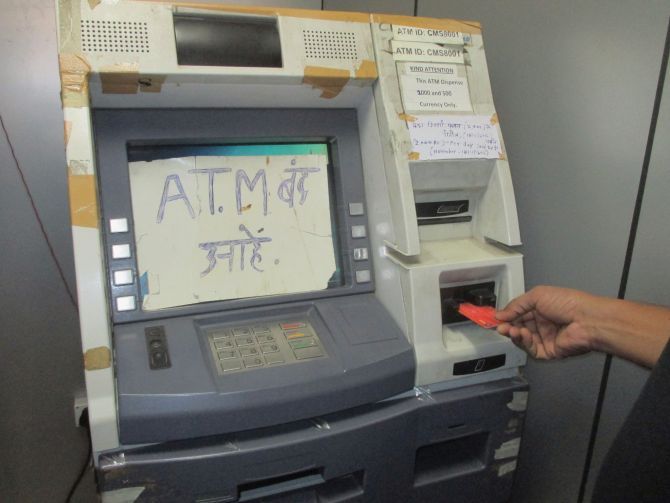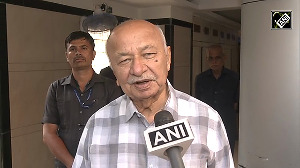'Corruption is the tree.'
'Black money is the fruit from the tree.' 'This scheme will expose the unaccounted fruits of the tree.'
'But since the tree will continue to stand, the story will continue,' say Pramod Kumar Srivastava, Sanghamithra and Kravya.

In a surprise move, the Government of India earlier this week demonetised currency notes of Rs 500 and Rs 1,000 denominations on Tuesday.
The main argument submitted by the government in favour of the move was that it will curb black money floating into the market.
Yes, in the short-term, it may give some benefits, but it is not a long-term solution. Let us analyse why:
Black money is not just wads of notes
Black money can be in the form of actual and benami properties like farmhouses, jewellery, costly household items, and vehicles.
Hard cash is only a minuscule part of black money.
This scheme will be able to detect the black money in the form of unaccounted hard cash only. It is highly improbable that people will stack up wads of notes in their homes.
Normally the hard cash recovered during income tax raids is of lesser value compared to all other items.
Black money is the end result of corruption
Corruption is the tree. Black money is the fruit from the tree.
This scheme will expose the unaccounted fruits of the tree. But since the tree will continue to stand, the story will continue.
In other words, it is the mindset of the people which needs to be changed. Otherwise, the same person will once again indulge in tax evasion and unlawful activities.
This scheme hits at the symptoms, not the root cause.
In 1978 the government had undertaken the same exercise, but black money did not disappear
In 1978, the Morarji Desai government had demonetised currency notes of Rs 1,000, Rs 5,000 and Rs 10,000 value. It did not work.
Skewed cost benefit analysis of such a move
In performing this huge exercise of phasing out old currency notes, new currency being printed, besides logistic, there are huge costs that are involved.
Above all, the time and energy of hundreds of millions of people is being deployed. All this constitutes the cost factor.
The benefit from reducing black money is based on conjectures, and we are not sure how much it will actually be.
This fact itself puts a big question mark over the success of the scheme.
Logic of higher denomination is being assailed, while the same is being proposed in the new scheme of things.
On one hand the government is assailing the concept of high denomination notes, on the other it is saying it will bring in new Rs 500 and even Rs 2,000 denomination notes.
This is contradictory.
The logic is being given that these new notes will be fool-proof, as if when the current denomination notes were brought into the market they were not 'fool proof'.
Hence the success of the whole scheme is under question.
That lower denominations will not create black money is questionable
There cannot be any logical proof that lower denomination currency notes do not create a black money problem.
Lower and higher denominations are a relative term.
It is not about the denominations, but the mindset.
A bribe taker will accept one single Rs 1,000 note, or 10 notes of Rs 100 denomination. It doesn't matter.
This is mainly about the domestic market
The current scheme is directed at the local market, while it is an open secret that the bulk of black money is stashed abroad by unscrupulous people and entities.
Moreover, money stashed abroad is in foreign currency, hence the scheme won't be applicable to those funds.
It is not hitting at the root cause of black money
Black money and fake money are generated because of corruption, poor processes and poor implementation of laws.
This scheme does not touch upon these core issues. Thus, it is a band-aid solution.
So while there will be some feel-good results for a few months, in the long term the situation will return to square one.
Hence, the scheme is inherently flawed.
Extremely flawed execution plan
Will the peanut hawker, coolie, construction labourer, housemaid, student etc have black money? The simple answer is, NO.
But if any of them has even a single Rs 500 note in their possession, they will all have to go through the rigmarole of exchanging that note.
What a colossal waste of human energy and untold agony!
It is nothing but a cruel joke on the entire population of the country.
Instead of setting some income limit etc, a blanket Executive order has been passed.
Such an order can never stand proper judicial scrutiny.
This order is inherently perverse, has been passed without proper application of mind and is draconian in nature, and hence liable to be set aside with strong strictures.
Nations are run on trust and based on role models
Any nation which does not trust its citizens and does not produce real-life role models is doomed to go into the dark, vicious cycle of corruption and black money.
If thousands of crores of black money is spent in elections, where the seats of MPs and MLAs are sold out, medical seats are sold out, jobs are auctioned -- it sets a bad example for society. The poor justice delivery system also adds to the problem.
Unless we have a proper and robust system in place and set positive role models in society, the problem of black money will continue and flourish.
Shock therapies may give the illusion of short-term benefits and people may thump their chest in pride, but in the long-term the problem will continue.
We can conclude that this scheme is totally flawed, draconian in nature, infringes upon the basic rights of citizens and has all the ingredients to create chaos in the financial markets as well as in society.
It is our humble appeal to the current dispensation that the scheme be immediately stalled, properly tweaked with judicial backing, and only then it should be implemented.
Sanghamithra and Kravya are business consultants with PKS Management Consultants. Pramod Kumar Srivastava is CEO, PKS Management Consultants, a generalist business consulting company based in Bangalore.
The views expressed are personal.
IMAGE: An ATM in Mumbai runs out of cash on Friday, November 11, soon after reopening after a two-day break to rejig its systems and issue new currency denominations. Photograph: Sahil Salvi











 © 2025
© 2025